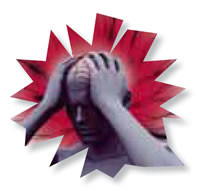Migraines: Can dementia, stroke or heart attack be next?

Two new studies from Harvard examine the possible associations between migraine headaches and other conditions. One study offers encouraging news: the headaches will not hurt thinking skills. Another study suggests a warning: the headaches, when accompanied by aura, may signal an increased risk of heart attacks and stroke. "After high blood pressure, migraine with aura was the second strongest single contributor to the risk of heart attacks and strokes," says study author Dr. Tobias Kurth, adjunct associate professor of epidemiology at the Harvard School of Public Health. "It was followed by diabetes, family history, smoking, and obesity."
To continue reading this article, you must log in.
Subscribe to Harvard Health Online for immediate access to health news and information from Harvard Medical School.
- Research health conditions
- Check your symptoms
- Prepare for a doctor's visit or test
- Find the best treatments and procedures for you
- Explore options for better nutrition and exercise
I'd like to receive access to Harvard Health Online for only $4.99 a month.
Sign Me UpAlready a member? Login ».
Disclaimer:
As a service to our readers, Harvard Health Publishing provides access to our library of archived content. Please note the date of last review or update on all articles.
No content on this site, regardless of date, should ever be used as a substitute for direct medical advice from your doctor or other qualified clinician.















